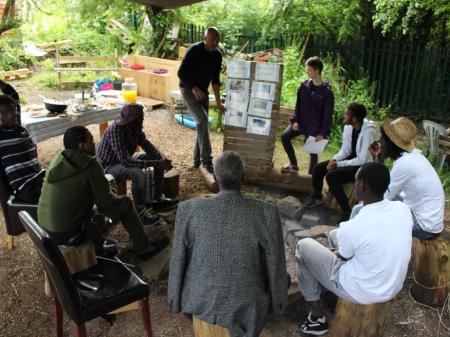Give2Grow energy workshop
Written by Naomi Gill, Support and Integration Officer
On the 21st March, ACH collaborated with Give2Grow to put on an event with discussion, workshops and a meal. I led a workshop for our Energy Project, funded by Bristol Community Energy Fund. 10 people attended the workshop, from six countries. These were a mixture of ACH learners, residents and friends. I was assisted by Ahmed, a Sudanese resident who took part in the last energy project. We started with a discussion about the types of homes people lived in, who pays the energy bills, whether it’s cheap or expensive, and whether our homes are warm or cold.
We talked about the fact that it is possible to make changes in our homes and lifestyle to improve energy efficiency and save money. Energy monitors gave a visual display to show how much money it costs to use different appliances, including boiling a kettle and heating an oil radiator. Everyone was surprised to see how expensive it is just to boil a full kettle or to heat the radiator for five minutes.
We looked at packaging which displays energy efficiency ratings and learnt about the benefits of investing in energy efficient appliances. We also discussed what we do to save energy around the house, including the use of timers, thermostats, draught excluders, insulation and secondary glazing. Some went home with energy-saving light bulbs, others with energy monitors and secondary glazing film to try out on their windows.
Some people were not responsible for paying the bills in their properties. These people said that the houses were often too warm, as others in the house constantly use the heating and they have no control. We suggested ideas to tackle this problem, such as agreeing on a timer setting with others in the house. Others said that they aren’t sure if it is cheap or expensive because it is their first time paying their own energy bills. It was a great opportunity to raise awareness and share ideas on energy and remember that we can all take small steps to save energy in our homes. If we continue the conversation in the community, it will have a ripple effect as people share ideas and discussion with their friends and family, becoming more and more conscious of energy saving.
